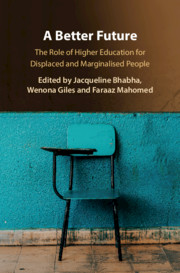Book contents
- A Better Future
- A Better Future
- Copyright page
- Contents
- Figures
- Tables
- Notes on Contributors
- Introduction
- Part I Encountering Marginalisation
- Part II Deconstructing Marginalisation
- Chapter 8 Providing Access to Higher Education for Refugees in Europe
- Chapter 9 The German Case
- Chapter 10 Colombian Distress Migrants in Ecuador
- Chapter 11 Transcending Socio-cultural Barriers
- Chapter 12 Combating the Exclusion and Marginalisation of Persons with Intellectual Disabilities in Higher Education in the United States
- Chapter 13 ‘Invisible’ Disabilities in South Africa’s Higher Education Sector
- Part III Confronting Marginalisation
- Index
- References
Chapter 13 - ‘Invisible’ Disabilities in South Africa’s Higher Education Sector
An Analysis of the Inclusion of Persons with Psychosocial and Intellectual Disabilities
from Part II - Deconstructing Marginalisation
Published online by Cambridge University Press: 06 September 2020
- A Better Future
- A Better Future
- Copyright page
- Contents
- Figures
- Tables
- Notes on Contributors
- Introduction
- Part I Encountering Marginalisation
- Part II Deconstructing Marginalisation
- Chapter 8 Providing Access to Higher Education for Refugees in Europe
- Chapter 9 The German Case
- Chapter 10 Colombian Distress Migrants in Ecuador
- Chapter 11 Transcending Socio-cultural Barriers
- Chapter 12 Combating the Exclusion and Marginalisation of Persons with Intellectual Disabilities in Higher Education in the United States
- Chapter 13 ‘Invisible’ Disabilities in South Africa’s Higher Education Sector
- Part III Confronting Marginalisation
- Index
- References
Summary
Numerous challenges face people living with disabilities in attempting to navigate the higher education (HE) space in South Africa. These include stigma and discrimination, lack of accommodations, lack of appropriate access to services and curriculum and policy oversights, often compounded by racial, gender and class inequalities that are also determinants of access. Even where disability is accommodated for, these accommodations often do not extend to the realm of ‘invisible’ disabilities, namely psychosocial and intellectual disabilities. This chapter considers how structural and systemic factors might militate to exclude people living with psychosocial disabilities from the HE space, particularly in terms of diversity and inclusion policies, and what can be done to address forms of marginalisation. In particular, it examines the accommodations made for people living with psychosocial disabilities in South Africa’s institutions of HE, while also examining the ways in which such accommodations can be supportive factors in retention and completion. Similarly, it considers what role the lack of accommodations might play in marginalising people living with psychosocial disabilities, hindering their participation and potentially adversely affecting outcomes. It also considers best practice in addressing the specific needs of people living with psychosocial disabilities in other HE contexts.
Keywords
- Type
- Chapter
- Information
- A Better FutureThe Role of Higher Education for Displaced and Marginalised People, pp. 292 - 314Publisher: Cambridge University PressPrint publication year: 2020

